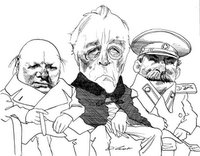World War II from its Contemporaries

Here is a review of the Library of America volume Reporting World War II: American Journalism, 1938-1946. Jake, infamous for his piquant studies on ancient near eastern culture and literature, has about-faced with his submission of this welcome piece. He is steadily churning out reviews (4 to my 1) on TKR, and puts us all to shame. Forthcoming is my own review of Paul Johnson's A History of the American People. - RD
War costs amount to lost husbands, missing body parts, and addled minds. But when books and movies attempt to recast these atrocities, their narrations are stained by the knowledge of later resolution. This collection of World War 2 American journalism, however, paints with deeper hues of grimness and more vivid impressions of reality because the outcome of the war is unknown.
The Library of America has collected many of the best (though I lament the inclusion of Gertrude Stein) eyewitness accounts of World War 2. It predictably begins with scathing editorials about Chamberlin and finishes with the Japanese surrender. And it includes all the stuff in betwixt. Although these events are facts known to any elementary student, the first-hand tales of intrigue, vice and mayhem are told by participants on a day-to-day basis. The Americans who became Nazis, the racial violence in the American military, and the army’s deleterious crawl through the mountains of Italy are described by those who saw the events transpire and by those who were uncertain about the future outcome of their prodigious struggle.
How then does one understand World War II? I invite you to allow the yarns of the participants lead you onto the gothic path of uncertainty. You will see that narrations ignorant to the end of the story paint onto canvases not found on the silver screen. And they are more engrossing too.
- Jake McCarty


2 Comments:
I think you make a good point about eyewitness accounts because people always know the outcome of good old fashion war movies, so that there is no real suspense. I think I'll buy this book and read it because my father was in WWII and he always says that the movies don't do any justice to the true war.
Pommes, your other books you mentioned are a bit out of my league, but it really sounds interesting, studying the history of people and such. How many languages do you know? I think its coll that this stuff shaped history.
Thank you for such a great site Roger. I'm reading the Broker by Jon Grisham right now and I'll make a review too. Its really fun.
Thank you for your kind comments walterreedmemori. It sounds like you really know your books, and it would be great to see you post a review on this forum. If you have any friends who are bibliophiles, please direct them to us.
As far as your question about languages, I've studied 5 ancient languages and 3 modern ones fairly significantly. I've found that the more I learn about other languages, the more I learn about English.
Post a Comment
<< Home